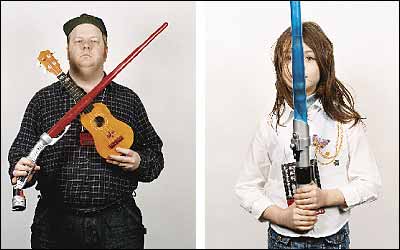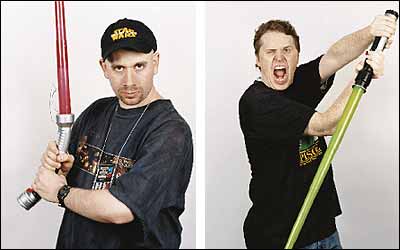
Has there ever been a better time to be a nerd than now? The nerd—named for a 1950 Dr. Seuss creation and distinct from the geek, the drip, the wimp, and the square—might be identified, for our purposes, as one who possesses an obsessive ardor for marginal, and arguably trivial, subject matter (sci-fi novels, comic books, the differences between Orcs and Half-Orcs), to the detriment, and possible outright neglect, of more widely embraced pursuits (attentive hygiene, communication skills, the differences between men and women). As such, nerds have long been the disdained wallflowers of popular culture. But these days, everyone’s lining up for a dance.
On Broadway, Monty Python’s Spamalot is nourishing hundreds of “Ni!”-spouting fans each night, like a nestful of chirping baby chicks. At the movies, the film adaptation of The Hitchhiker’s Guide to the Galaxy—a kind of On the Road of nerddom—topped the box office in its first weekend, squashing the burly, testosterone-soaked XXX. This year we’ve already seen the slavishly faithful, nerd-delighting Sin City, and there’s a new Batman movie on the way—a dark and authentic version that has comics fans churning in their Batman sheets. And, of course, this weekend brings the long-awaited release of Revenge of the Sith, the climax to that ongoing, three-decade-spanning, bacchanalian nerd orgy otherwise known as Star Wars. It’s fitting, in fact, that a new Star Wars film should mark the zenith of this nerd ascendancy, as the first film, way back in 1977, was the movie that launched the ascent. Unlike Star Trek, Star Wars crossed over immediately to the masses—nerds and civilians braided together in lines that curled around the block.
But unlike today’s films, Star Trek and Star Wars weren’t created for nerds—rather, they created nerds. (Gene Roddenberry is to nerds as Henry Ford is to Model T’s.) And I say this as one of the creations: a grown man who, while not fluent in Klingon or Elvish, got poleaxed by Star Wars at age 7 and who to this day carries a Han Solo key chain, dangling in my pocket like the medal of a patron saint. Now movies like Hitchhiker’s or Spider-Man 2 or the recent Lord of the Rings trilogy are made for nerds, by nerds, and with nerds in mind. Nerds have always had their culture. But now it’s become the culture.
It’s not hard to see why Hollywood has gone cuckoo for the nerds. For starters, they’re the ideal audience. They are legion. They are rabid. They are loyal—to a point. They are also famously finicky, and you tinker with their passions at your peril. Nerds did not flock to the first Star Trek film, for example, because they could sense that this snoozer lacked an essential Star Trek–y-ness, an essence they understood better than did the film’s own creators. On the other hand, Peter Jackson’s been canonized to geek-saintdom for the strident fidelity of his Tolkien trilogy.
And, thanks to the Web, nerds are more powerful than ever. Their brand of obsessive fanboy quarreling, which used to happen among three friends in someone’s basement over a twenty-sided die, has been focused and amplified by the Internet, the single greatest tool ever devised for collective heartfelt blathering. For proof of the nerd’s new clout, consider this: The line of Star Wars fans already assembled outside L.A.’s Grauman’s Chinese Theatre, waiting for Revenge of the Sith to open, not only has its own Website, liningup.net, but its own PR representative.

Nerds aren’t just noisy; they’re desirable, thanks to concrete changes in the way entertainment’s marketed and sold. The old movie model, for example, was to produce a film that would appeal, more or less, to as many people as possible, eventually enjoying a long run in theaters. Video, and now DVDs, has changed that, so the current goal is to create an “event” film: Release it wide, draw huge crowds, and claim the top box-office spot. How better to accomplish this than to mount a film that comes prepackaged with a large, fanatical audience—in other words, with nerds? A Green Lantern film, say, isn’t guaranteed to be a hit, but it’s a good bet to draw every Green Lantern fan in the universe out for opening night—especially if they’re happy with the casting, which they’ve no doubt been debating online for months. Heck, they’ll probably even line up in advance. For months. In costumes.
This shift doesn’t just favor nerd-oriented movies but any product that can cash in on DVD sales (of deluxe editions, collector’s editions, two-disc anniversary boxed sets). TV networks are no longer solely interested in shows that appeal, even weakly, to a large mass audience. Now there’s money to be made by series like Alias and 24 that draw a relatively small but intense following—one that’s devoted enough to jabber about the show online, then shell out 30 bucks for each new season’s worth of discs.
Of course, the Lord of the Rings movies didn’t clear $1.9 billion solely on the spindly backs of Tolkien completists. There are obvious overlaps between traditional nerd passions—explosions, superheroes, impossibly buxom women—and the enthusiasms of the populace at large. What’s really infiltrated the culture isn’t a nerd aesthetic but a nerd ethos. The Internet explosion of the nineties loosed a barrage of knee-jerk REVENGE OF THE NERDS headlines, all of which evinced an outsider’s wrongheaded view of nerddom: If it wears glasses, and it works with a computer, then it must be a nerd. But as every nerd knows, there are several different, and non-overlapping, nerd variants. Comic-book nerds are very different from sword-and-sorcery nerds, who are different from sci-fi nerds. Even Trekkers and Star Wars geeks barely mix, shunning each other like the Jets and the Sharks.
For nerds, irony was never part of the equation. No one’s ever worn Spock ears with a smirk.
But one trait unites these various nerd fiefdoms, like a flag flying over the whole kingdom: Nerds are entirely, essentially, and inherently earnest. No one’s ever worn Spock ears with a smirk. For nerds, irony was never part of the equation. They, with each thrum of their pure nerd hearts, are unabashed, unapologetic fans: of science, of lore, of alternate worlds, of space-chicks with trembling racks. If the rest of the culture’s come round to nerd thinking, then what does that tell us? Perhaps people are buying into the delights of earnest, giddy enjoyment—the joy of being a nerd. And then suddenly you realize that, in the end, everyone’s a nerd, not just those of us with Han Solo key chains. Did you preorder the next season of Sex and the City on DVD as soon as it was announced? Then you, my friend, are a nerd. Do you faithfully trudge out to each new Jude Law film, hypnotized by that rakish grin? Hello, Jude Law nerd. Do you hotly debate Broadway debuts, haunt the newest eateries, track obsessively the ups-and-downs of your favorite team? One might call you an aficionado, a foodie, or a sports nut. Or more succinctly: a nerd, a nerd, and a nerd.
In short, we’re all nerds now. If you have an earnest passion of any kind, you carry a dormant nerd gene. And if you’re still ironically rocking a mullet or dressing like Pat Benatar, well, the culture is leaving you behind. Nerdism, as it turns out, isn’t a defect reserved for oddballs but an antidote to irony for all. And what we’re experiencing now is simply a mass inoculation.